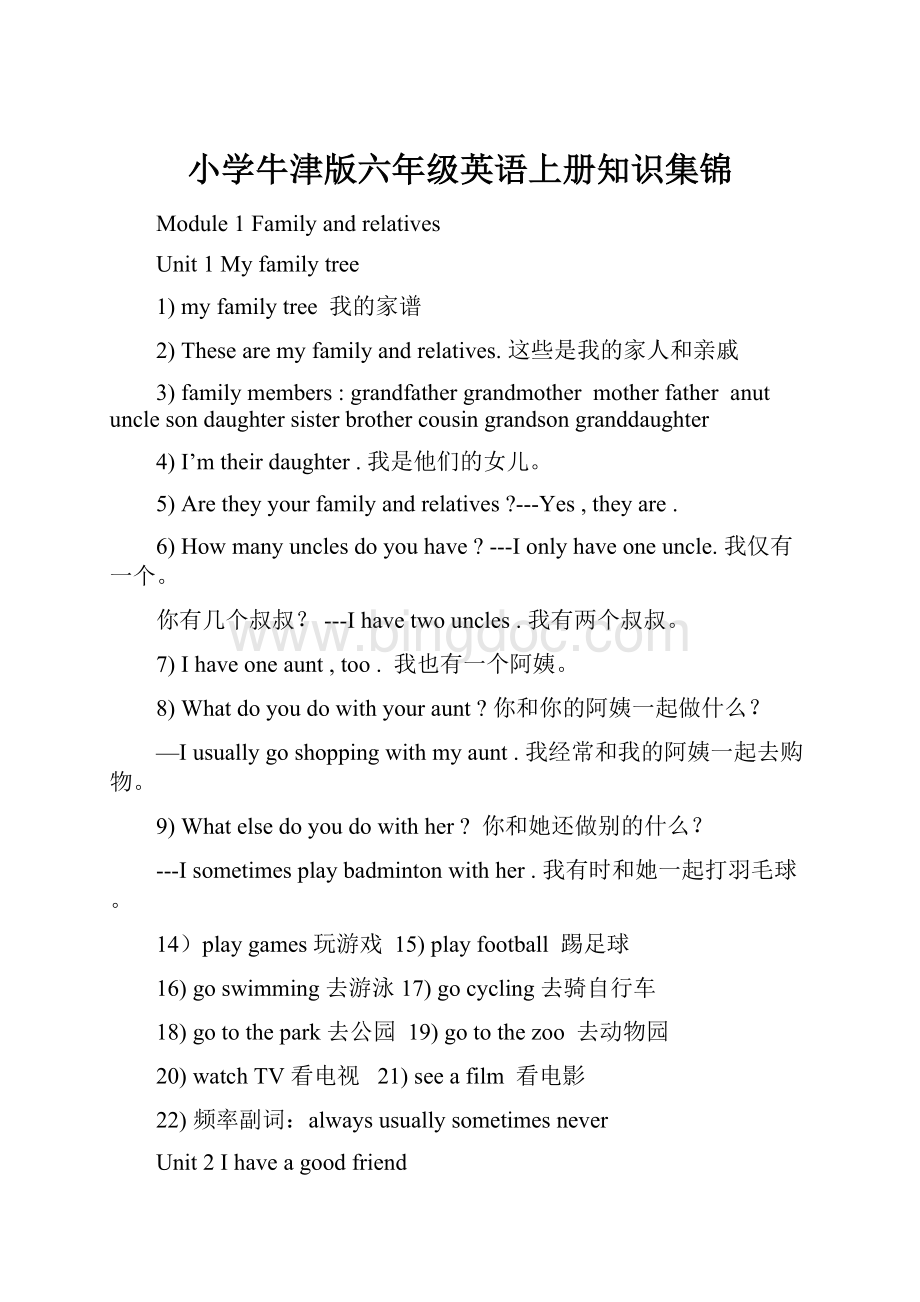小学牛津版六年级英语上册知识集锦.docx
《小学牛津版六年级英语上册知识集锦.docx》由会员分享,可在线阅读,更多相关《小学牛津版六年级英语上册知识集锦.docx(20页珍藏版)》请在冰点文库上搜索。

小学牛津版六年级英语上册知识集锦
Module1Familyandrelatives
Unit1Myfamilytree
1)myfamilytree我的家谱
2)Thesearemyfamilyandrelatives.这些是我的家人和亲戚
3)familymembers:
grandfathergrandmothermotherfatheranutunclesondaughtersisterbrothercousingrandsongranddaughter
4)I’mtheirdaughter.我是他们的女儿。
5)Aretheyyourfamilyandrelatives?
---Yes,theyare.
6)Howmanyunclesdoyouhave?
---Ionlyhaveoneuncle.我仅有一个。
你有几个叔叔?
---Ihavetwouncles.我有两个叔叔。
7)Ihaveoneaunt,too.我也有一个阿姨。
8)Whatdoyoudowithyouraunt?
你和你的阿姨一起做什么?
—Iusuallygoshoppingwithmyaunt.我经常和我的阿姨一起去购物。
9)Whatelsedoyoudowithher?
你和她还做别的什么?
---Isometimesplaybadmintonwithher.我有时和她一起打羽毛球。
14)playgames玩游戏15)playfootball踢足球
16)goswimming去游泳17)gocycling去骑自行车
18)gotothepark去公园19)gotothezoo去动物园
20)watchTV看电视21)seeafilm看电影
22)频率副词:
alwaysusuallysometimesnever
Unit2Ihaveagoodfriend
1)Ialwaystalktoher.talktosb与某人谈话
2)Shedoesn’ttalkatall.not…atall一点也不
3)Shelikestoplay.liketodosth/likedoingsth喜欢做某事
4)Wegototheparkalmosteveryday.almost几乎everyday每天
5)Shecan’treadorwrite.can是情态动词,之后用动词原形。
6)
ShesometimeswatchesTVandnevergoesoutatnight.
有时看电视从不外出在晚上
7)Myfriendisalittledog.alittle小的
8)Theyalwayswalktoschool.他们总是不行去学校。
playtogether.一起玩耍。
eatlunchtogether.一起吃午餐。
sharefood.分享食物。
helpeachother.互相帮助。
helpotherpeople.帮助别人。
9)
Sheisalwaysfriendlyandhelpful.她总是很友好,很乐于助人。
10)Shealwaysworkshard.workhard努力工作,努力学习
11)Sheisneverlateforschool.belatefor……迟到
12)Shenevergetsangry.getangry生气
13)Sheisalwayskindtoothers.bekindtosb对某人很友好
14)Shealwayssharesherfoodwithme.sharesthwithsb和某人分享某物
15)Shenevertellslies.telllies说谎
16)HaveyoubeentoOceanParkyet?
----Yes,Ihavealreadybeenthere
havebeento…曾经去过…-----No,Ihaven’tbeenthereyet.
你曾经去过海洋公园吗?
---是的,我曾去过那里。
/--不,我还没有去过。
17)WhataboutWaterWorld?
whatabout…“…怎么样”
18)forthefirsttime第一次
Unit3Spendingadayouttogether
1)
nearfarawayfrom(反义词)2)goswimming去游泳
3)goshopping去购物4)flykites放风筝
5)
playfootball6)haveapicnic去野餐7)ridebicycles
basketballlunch吃午餐骑自行车
badmintondinner吃晚餐
8)onSaturday在星期六9)agoodidea一个好主意10)howmuch多少钱
11)howabout怎么样12)begoingtodosth将要做某事13)allright好吧14)Thisisaphotographofmymotherandme.(一张…的照片)
15)WherehaveyoubeeninBeijing?
你曾去过北京的哪里?
----IhavebeentoTiananmenSquare.我曾去过天安门广场。
17)
一般将来时
Howarewegoingtogetthere?
我们将怎样到达那里?
----Let’sgobybus.咱们乘公共汽车吧。
(begoingtodosth将要做某事)
18)Whenarewegoingtocomeback?
我们将什么时候回来?
----Wearegoingtocomebackatsixo’clock.我们将在六点钟回来。
19)Whichplaceshallwevisit?
我们将去参观哪个地方?
----Let’sgototheGreatWall.咱们去长城吧。
(letsbdosth让某人做某事)
20)Howmuchdoesitcost?
它花费多少钱?
(物花费用cost)
21)Howaboutnineo’clockinthemorning?
早上九点怎么样?
22)Whatdoyouusuallydoatweekends?
你经常在周末做什么?
----IusuallygoshoppinginWangfujingStreet.我经常在王府井街购物。
23)IsWangfujingStreetnearorfarawayfromTiananmenSquare?
----ItisnearTiananmenSquare.(选择性的一般疑问句要从中选一个来答)
----ItisfarawayfromTiananmenSquare.
24)Whatareyouandyourmotherdoingtogether?
你和你的妈妈正在做什?
----Weareplayingbadmintontogether.我们正在打羽毛球。
现在进行时(am/is/are+动词的ing形式)
25)playgameswithsb和某人一起玩游戏
26)nextSaturday下周六27)byunderground乘地铁
28)Itwillbeagreatday它将会是非常棒的一天
Module2Placesandactivivies
Unit1Whatwouldyouliketobe?
1)十七种职业:
asecretary,abankclerk,apoliceman,apolicewoman,
adentist,apilot,afireman,apostman,ashopassistant,
afisherman,adriver,doctor,anurse,acook,aworker,
ateacher,astudent
2)Wouldyouliketobeapoliceman?
---Yes,Iwould.
你想当个警察吗?
----No,Iwouldn’t.
3)Why?
----BecauseIwanttomakeourcityasafeplace.
wanttodosth想要做某事使我们的城市成为一个安全的地方
4)Whynot?
----BecauseIdon’tlikecooking.(likedoingsth)
5)Whatwouldyouliketobe?
你想当什么?
(wouldliketodosth)
----I’dliketobeapostman.我想当一名邮递员。
(I’d=Iwould)
6)Whatisyourjob?
----I’madoctor.你的工作是什么?
我是一名医生。
7)makesickpeoplebetter使病人好转
8)Whendoyouusuallystartwork?
开始工作
Whendoyouusuallyfinishwork?
结束工作
Unit2OpenDay
1)openday开放日
2)plantodosth计划做某事
e.g.:
Iamplanningtogohome.(现在进行时:
am/is/are+动词的ing形式)
3)will“将要”情态动词(之后用动词原形)o’clock.
eg:
Wewillcomebackatsixo’clock.=Wearegoingtocomebackatsix
一般将来时其句子结构:
will+动词原形
begoingto+动词原形
4)arriveat+小地点“到达某地”
in+大地点
5)attheentrance在入口处
6)Whatwilltheydofirst?
他们首先将做什么?
7)visitourclassroom参观我们的教室8)attwofifteen在两点十五分
9)Whatwilltheydonext?
接下来他们将做什么?
10)lookatourclassprojects观看我们的班级课题
11)Wherewilltheydothis?
他们将在哪里做这个?
12)intheArtsandCraftsroom在美术手工课教室
13)attwothirty=athalfpasttwo在两点半
14)Whatwilltheydothen?
然后他们将做什么?
15)listentotheschoolchoir听学校合唱团唱歌
16)inthehall在礼堂17)atthreeten在三点十分
18)Whatwilltheydoafterthat?
在那之后他们将做什么?
19)lookatourEnglishClubnoticeboard看我们英语俱乐部的布告栏
20)inthelibray在图书馆
21)Whatwilltheydofinally?
最后他们将做什么?
22)haveteaandcakeswiththeteachers和老师一起喝茶吃蛋糕
23)intheMusicroom在音乐教室
24)atfourtwenty-five在四点二十五分
25)Iwantyoutowelcometheparentsindifferentplaces.
wantsbtodosth欢迎父母亲在不同的地方
25)
WherewillKittybe?
—She’llbeintheArtsandCraftsroom.
inthelibrary
inthemusicroom
inthehall
intheclassroom.
26)
Whereisit?
---It’sonthegroundfloor.在一楼
first在二楼
second在三楼
third在四楼
27)一般过去时
●一般过去时表示过去某个时间发生的动作或存在的状态。
常和表示过去的时间状语连用。
(lastyear,yesterday)
e.g.Ididmyhomeworkyesterday.
Iwentshoppinglastweek.
●动词过去式的构成:
(1)规则动词过去式的构成有四条规则:
A.一般直接在动词原形末尾直接加上ed。
如:
look-looked
B.以不发音的字母e结尾的动词,去e再加ed。
如:
live-lived
C.末尾只有一个辅音字母的重读闭音节,先双写这个辅音字母,再加ed。
如:
stop-stopped
D.末尾是辅音字母加y结尾的动词,先变y为i,然后再加ed。
如:
study-studied.
(2)不规则动词的过去式需特殊记忆。
如:
am(is)-was,are-were,go-went,come-came,take-took等。
小学阶段常出现的动词原形变过去式有:
原形
过去式
原形
过去式
原形
过去式
am/is
was
come
came
have
had
are
were
stop
stopped
look
looked
go
went
get
got
say
said
play
played
study
studied
stay
stayed
watch
watched
take
took
buy
bought
live
lived
listen
listened
see
saw
do
did
visit
visited
eat
ate
arrive
arrived
28)takesomephotos照相
29)first,…next,…then,…afterthat,…finally,…(事物发展的先后顺序)
首先紧接着然后在那之后最后
30)Hewillarriveattwoo’clock.他将在两点钟到达。
Unit3Goingtoschool
1)Doyoulivenearorfarawayfromschool?
—Ilivenearschool.
----Ilivefarawayfromschool.
2)
Howdoyougotoschool?
---Igotoschoolbybus/bycar/bybicycle
byschoolbus/byunderground
bytram/byplane/byship
bytrain/onfoot
3)Howlongdoesittake?
----Ittakesabouthalfanhour.
ittakessb+时间+todosth.做某事花费某人……时间
e.g.:
Howlongdoesittakeyoutogettothesupermarket?
-----Ittakesmeabouthalfanhourtogetthere.
anhour
4)gettothesupermarket5)gettothepark
6)gettothepostoffice7)gettothelibrary
8)Whatdoyouseewhenyouareonthebus?
---IseealotofpeoplewhenIamonthebus
Whatdoessheseewhensheiswalkingtoschool?
----Sheseesafewparentswhensheiswalkingtoschool.
9)some和alotof既可以修饰可数名词复数也可以修饰不可数名词
10)afew修饰可数名词复数(alotof>some>afew)
Unit4Rulesaroundus
1)Wheredowehaverules?
---Wehaverulesintheclassroom.
在哪里有规则?
inthelibrary.
2)must必须情态动词之后ontheroad
mustnot=mustn’t禁止用动词原形inthepark.
4)
Wemustnotplayballgames.玩球类游戏
Wemustnotleaverubbish.扔垃圾
Wemustnoteat
drink.吃和喝(否定句或疑问句中表连接用or)
Wemustnotdrawonthedesks.在桌子上画画
and(和)肯定句中表连接。
but(但是)表转折。
Wemustlistentoourteacher.听老师的话
Wemustkeepquiet.保持安静
Wemustnotplay.玩
Wemustnotrunacrosstheroad.跑过马路
Wemustwaitforthegreenman.等绿灯
Wemustnotwalkonthegrass.践踏草坪
Wemustnotpicktheflowers.摘花
Wemustnotclimbthetrees.爬树
Don’tturnleft
Don’twalkonthegrass
Don’tclimbthetrees
Don’tenter
Don’trun
Don’teatordrink
Don’tleaverubbish
Don’ttalkloudly
Don’tplayballgames
5)
6)Whatdoesthissignmean?
这个标志是什么意思?
---Wemustnoteatordrink.我们禁止吃喝
7)Wherecanwefindit?
我们能在哪里找到它?
---Wecanfinditinalibrary.我们能在图书馆里找到它
8)Youmustnotbelateforschool.=Don’tbelateforschool.禁止上学迟到
Module3Foodanddrink
Unit1Thefoodweeat
1)Whatwouldyoulikefordinner?
你晚餐想要吃什么?
---I’dlikenoodlesfordinner.我想吃面条。
2)Wouldyoulikemeatorseafood?
你想要肉还是海鲜?
---I’dlikeseafood.我想要海鲜。
汤?
西红柿还是卷心菜
3)Whatkindofsoupwouldyoulike?
tomatoorcabbage?
你想要什么种类
---I’dliketomato./Let’shavetomato.我想要西红柿。
4)I’dalsolikesomesoup.=I’dlikesomesoup,too.
also用于助动词,be动词,情态动词之后,实义动词之前。
too放在句子末尾,前用逗号隔开。
5)wouldlike=want想要6)steamedprawnswithgarlic蒜茸清蒸虾
7)afterdinner饭后tomatoandeggsoup西红柿鸡蛋汤
8)needtodosth需要做某事friedeggswithbacon咸肉炒鸡蛋
9)boiledeggs水煮蛋10)friedchickenwings炸鸡翅
11)chickensoup鸡汤12)fried炸的boiled水煮的steamed清蒸的
13)Haveyouboughtanyprawns?
(any用于否定句和疑问句中)
---Yes,Ihaveboughtsomeprawns.(some用于肯定句中)
14)Wheredidyoubuythem/it?
一般过去时did之后用动词原形
(前文出现的是可数名词复数用them,可数名词单数或不可数名词用it)
---Inthesupermarket,intheseafoodsection.
15)Howmuchwerethey/wasit?
--Theywere/Itistwenty-fiveyuan.
前文出现的是可数名词复数用arethey/theyare,
可数名词单数或不可数名词用wasit/itwas
16